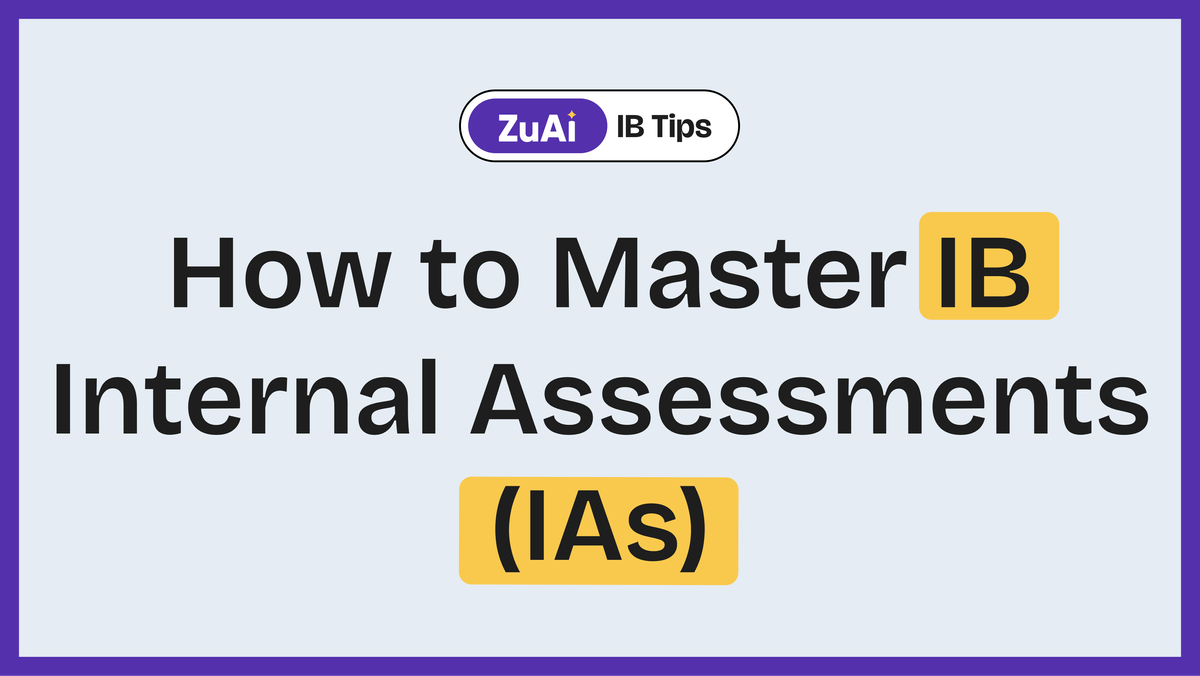How to Master IB Internal Assessments (IAs): A Complete Guide for N24 and M25

Author: Olivia Barnes, IB Educator and Examiner
Introduction
Internal Assessments (IAs) are a vital part of the IB program, contributing significantly to your overall grade in each subject. Unlike final exams, which test your knowledge in a high-pressure environment, IAs give you the chance to showcase your research skills, critical thinking, and subject mastery over time. However, many IB students find IAs challenging due to their rigorous requirements.
In this guide, we’ll break down how to approach your IB Internal Assessments strategically for N24 and M25. From topic selection to writing and presenting, these steps will help you score top marks on your IAs across all subjects.
What Are IB Internal Assessments (IAs)?
IB Internal Assessments are individual projects, essays, or experiments conducted in most IB subjects. They count towards your final IB grade and are assessed by both your teacher and external moderators. The type of IA varies depending on the subject but can include lab reports in Sciences, essays in Humanities, and oral presentations in Languages.
Step 1: Choosing the Right IA Topic
The first and most important step in any IA is choosing a topic that aligns with both your interests and the IB syllabus. A well-chosen topic will make the research and writing process much easier and more enjoyable.
Tips for Choosing Your IA Topic:
- Pick something you’re passionate about: You’ll be spending a lot of time working on this project, so choose a topic that genuinely interests you.
- Ensure it's feasible: Your topic should be manageable within the given word count, time frame, and available resources.
- Align with IB criteria: Always refer to the subject-specific criteria to ensure your topic meets the requirements for analysis and evaluation.
Example: For a Biology IA, instead of choosing “Photosynthesis,” you could narrow it down to “How does different light intensity affect the rate of photosynthesis in Elodea?” This will allow for a focused and detailed investigation.
Step 2: Planning and Researching
Once you have chosen your topic, it’s time to dive into planning and research. The best IAs are those that are well-researched and thoroughly planned, with clear objectives and a logical structure.
Steps for Effective Research:
- Outline your objectives: What are you trying to discover or prove through your IA?
- Conduct preliminary research: Use books, academic papers, and reliable online resources to gather information about your topic.
- Create a research plan: Organize your data collection, whether it's through experiments, surveys, or literature review.
Pro Tip: For subjects like Business Management or Economics, use real-world case studies or data to support your analysis.
Step 3: Writing Your IA
Once you’ve completed your research, the next step is to write your IA. Every IB subject has specific writing criteria, but there are a few general guidelines that apply to all subjects.
Key Points for Writing Your IA:
- Introduction: Clearly state your research question or hypothesis and explain its relevance.
- Body: This is where you analyze your data or arguments. Each paragraph should focus on a specific point, backed by evidence from your research.
- Analysis and Evaluation: Don’t just present your findings—analyze them. Discuss what your data means, how it supports your hypothesis, and acknowledge any limitations in your research.
- Conclusion: Summarize your findings and reflect on the broader implications of your investigation.
Pro Tip: Refer to IB Internal Assessment examples in your subject to understand how top students structure their IAs and present their research effectively.
Step 4: Presenting Data and Analysis
How you present your data can significantly impact your IA score, especially in subjects like Mathematics, Sciences, or Economics, where data and statistics are key. Use graphs, tables, and charts to clearly represent your findings.
Tips for Presenting Data:
- Ensure your graphs and charts are labeled correctly, with titles and units.
- Only include data that is relevant to your research question.
- Use tables to summarize large sets of data, and provide explanations alongside them.
Pro Tip: Use tools like Excel or Google Sheets to create clean, professional-looking graphs and charts. For qualitative subjects like History or English, focus on clear, logical paragraph structure instead.
Step 5: Citing Sources and Academic Honesty
The IB takes academic honesty very seriously. To avoid plagiarism, make sure you cite all your sources correctly and keep a record of your research. This is particularly important in subjects like History or Theory of Knowledge (TOK), where referencing external material is crucial.
How to Cite Correctly:
- Use citation styles like MLA, APA, or Chicago, depending on your subject requirements.
- Include a full bibliography at the end of your IA.
- Be mindful of in-text citations whenever you quote, paraphrase, or refer to another work.
Pro Tip: Use citation tools like EasyBib or Zotero to ensure your citations are formatted correctly and consistently.
Bonus Tip: AI app for IB Exams = ZuAI
It's the ultimate AI app designed to help your child excel in their IB exams. As a parent, you want the best for your child, and so do we.
ZuAI provides personalized study support, practice questions, and detailed explanations tailored specifically to the IB curriculum.
Think of it as a smart tutor who understands your child’s unique learning needs, helping them tackle challenging subjects with confidence.
With ZuAI, you can feel reassured knowing your child is getting the extra help they need to succeed and build a bright future.
We genuinely care about your child's success and are here to support them every step of the way.

Looking for free solutions to previous year's question papers? Check out ZuAI's YouTube channel.
FAQ Section
Q1: How long should my IB IA be? A: The word count varies depending on the subject. For most subjects, it’s between 1,500 and 2,200 words. Always check your subject-specific guidelines for exact word limits.
Q2: How much time should I spend on my IA? A: IB recommends dedicating a significant portion of your study time to your IA, as it carries considerable weight in your final grade. Start early and aim to finish ahead of deadlines, leaving time for revisions and feedback from your teacher.
Q3: Can I change my IA topic after starting? A: Yes, but it's important to do so early in the process. If you find that your chosen topic isn’t feasible or doesn’t align with the assessment criteria, consult with your teacher and make adjustments as soon as possible.
Q4: How should I handle the analysis in my IA? A: The analysis should go beyond simply presenting data. It’s about interpreting what the data means and connecting it to your research question. Discuss limitations, evaluate outcomes, and consider alternative perspectives if necessary.
Q5: Can I use primary and secondary data in my IA? A: Absolutely. In fact, using both types of data can strengthen your IA. For example, in subjects like Business Management or Geography, primary data from interviews or surveys paired with secondary data from research papers can provide a strong foundation for your analysis.
Step 6: Proofreading and Finalizing Your IA
Before submitting your IA, it’s crucial to proofread your work for clarity, coherence, and grammatical accuracy. Also, ensure that your research question is clearly answered, and all parts of the IB criteria are met.
Final Steps:
- Review the rubric: Make sure your IA addresses all the criteria laid out by the IB for your subject.
- Seek feedback: Ask your teacher or a peer to review your draft and provide constructive criticism.
- Make revisions: Based on the feedback, revise your IA to ensure it is polished and ready for submission.
Pro Tip: Don’t wait until the last minute! Give yourself enough time to make revisions and improve the quality of your work.
Conclusion
IB Internal Assessments are a fantastic opportunity to showcase your research skills and subject knowledge in a more flexible format than exams. By carefully choosing your topic, conducting thorough research, and presenting your analysis clearly, you can achieve top marks in your IA for the N24 and M25 sessions. Follow the steps outlined in this guide, and remember, the key to success is planning and staying organized.
Good luck with your IB IAs!
